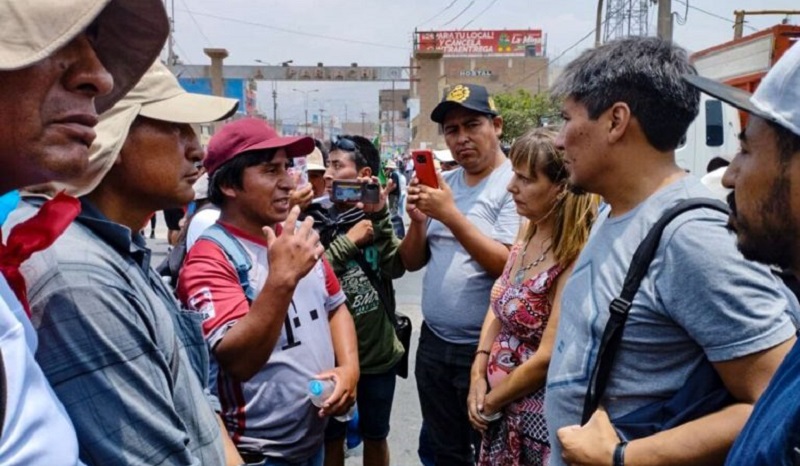
“I had never seen anything like it. It is a level of repression and international concealment typical of a dictatorship. The Army is carrying out massacres. Latin American governments should have another position in the face of what is a true uprising of the Peruvian people against the de facto government of Dina Boluarte. If they do not repudiate it, they are legitimizing it”.
Alejandrina Barry is the daughter of those who disappeared from the Argentine military-civic dictatorship that began in 1976 and a deputy for the City of Buenos Aires. In these days she traveled to Peru together with her partner, the national deputy Alejandro Vilca (Partido de los Trabajadores Socialistas, PTS). Alejandrina is vice president of the Commission against Institutional Violence of the Legislature of the City of Buenos Aires, and he is a member of the Human Rights commission of the National Congress. In those institutional spaces they will demand a pronouncement against Boluarte. After a week in that country, Barry affirmed to Presentes: “Despite the massacres, the unity of workers, students, peasants and indigenous people is a profound force that can affect the owners of power.”
Just landed from Lima, the legislator and human rights activist describes that “there are more than 60 deaths in 60 days. And that’s the official figure. The marches end and the Army persecutes the demonstrators and kills them. We did not finish counting the dead; there are disappeared, tortured. The judicial cases are tremendous because they are based on the legal scaffolding left by the time of (Alberto) Fujimori. They put you in jail for terrorism.”
-The day of that strike there was no repression because there were foreign observers?
I am the daughter of disappeared persons and I have never seen anything like this. When you arrive there are Army tanks, the march was 7,000 people and there were 11,000 policemen. They are intimidating operations to terrorize the population. I think they did not repress because the organized labor movement was mobilizing.
Disinformation and media siege
You mentioned misinformation. Does that turbidity conspire against the impunity with which Boluarte is managed?
– That is the most serious thing, in dictatorships the press misrepresents or silences. Now they discovered the Ayacucho and Puno massacres. The official information had said that on December 15 the demonstrators wanted to take over the airport, that the military repressed defensively and that the demonstrators had killed each other. The investigations of the prosecutor’s office now come to light and realize that the Army chased the protesters in the streets of their region and shot them, not even at the scene of the events. This is what needs to be disseminated internationally. In the case of Puno, they repressed even at the wake for the victims. Due to this siege of misinformation, we organized a march with the Peruvian community here to demand that all Latin American governments, the Celac that met in Argentina, condemn what is happening in Peru. In the case of Brazil, there is a very serious fact, it is sending tear gas to Peru, (Jair) Bolsonaro bought them, but Lula could have refused to send them. The demand is that Alberto Fernández break relations with the government of Dina Boluarte and that he condemn the coup and the repression of the Peruvian people.
– Does this repression include disappearances, torture and a high degree of secrecy?
-It is known that there are more than 60 murdered, with Alejandro Vilca we met with members of the communities and they denounced disappearances, and that the arrests are made with torture methods. In the delegations where the peasants and natives are, it seems that anything goes, but they also repress the students. A very serious event is the military intervention at the University of San Marcos because the students had opened the doors to the peasants so they could stay. There were 200 detainees when the Army entered with tanks. The Human Rights Coordinator explained that the cases initiated against those who protest are based on articles on terrorism. There are more than 100 prosecuted for that crime, or for defending that crime when they are participating in the mobilizations.
-They are applying in legal scaffolding inherited from Fujimori.
-That’s how it is. Let’s remember that Peru has 21,000 disappeared since the 1980s. There is a lot of solidarity, the merchants in the area support the collections so that the mobilizations to Lima can be carried out. A woman who had collected money for that was accused of being part of a criminal organization, which means 36 months in prison. It’s as if she were imprisoned here as a criminal for organizing a struggle or strike fund.
How did you see the situation of the wounded?
–They point to the head, those who lost an eye do not have medical coverage and the health system does not care for them, they do not have medical attention. The State endorses all of this and not a single police or military officer has even been investigated. It is total impunity, it is feeling firsthand what the dictatorship in Argentina was. On the contrary, in the midst of the repression they gave the police a bonus to reward them.
The persecution of LGBTI people
–Did you learn of the murder of a young trans woman, Ruby Ferrer?
-Yeah. The persecution of the LGBTI community is tremendous, the Castillo government called itself progressive, but it was anti-rights. Now it’s all worse. The LGBT+ community and women have been paddling since before. To say that you are a feminist means persecution. Not to mention if you say you’re left.
–What is your conclusion after these days in Peru?
-We must support the mobilization process of the Peruvian people because it is a great example for the rest of the peoples of Latin America. I felt like I was living through the genocidal dictatorship in Argentina, in my case when my parents disappeared I was appropriate, and the press mounted a campaign to hide the facts. That is why it is so important to break the media siege that exists on these crimes of state terrorism against the Peruvian people. We cannot allow this level of repression and killings to continue to be perpetuated with impunity, international condemnation is essential. On Wednesday the 22nd we are going to hold a hearing in Congress with Alejandro Vilca, Myriam Bregman and Nicolás del Caño, together with the Peruvian community, where we will present these reports that we brought. And we will deliver to the human rights commissions.
– Do you see any relationship with the uprising in Chile in 2019?
Yes, as they said in Chile, it’s not 30 pesos, it’s 30 years, they are demands postponed for decades. I met daughters of the disappeared in Peru, who continue to dig to find out where the bodies of their parents are, there was no investigation, much less punishment of the culprits. There is a huge precariousness of life. 85 percent of the population in Peru works informally and from sunrise to sunset. The demands of the indigenous population are central, only since the 1970s have they been able to vote. There is a very important labor movement, for some reason the Army keeps the mines surrounded. If the miners and port workers in Peru were to stop, the situation would change. Workers, peasants, students and indigenous people are a profound force that could affect those who hold power. They debate how to win this fight, which begins with the fall of Dina Boluarte, and end these massacres. It continues with thinking about how to build a different society, on new bases, thinking of a free and sovereign Constituent Assembly but on the basis of a provisional government of worker, peasant and indigenous community organizations.
*Interview originally published in Argentinian time
Source: www.laizquierdadiario.com

